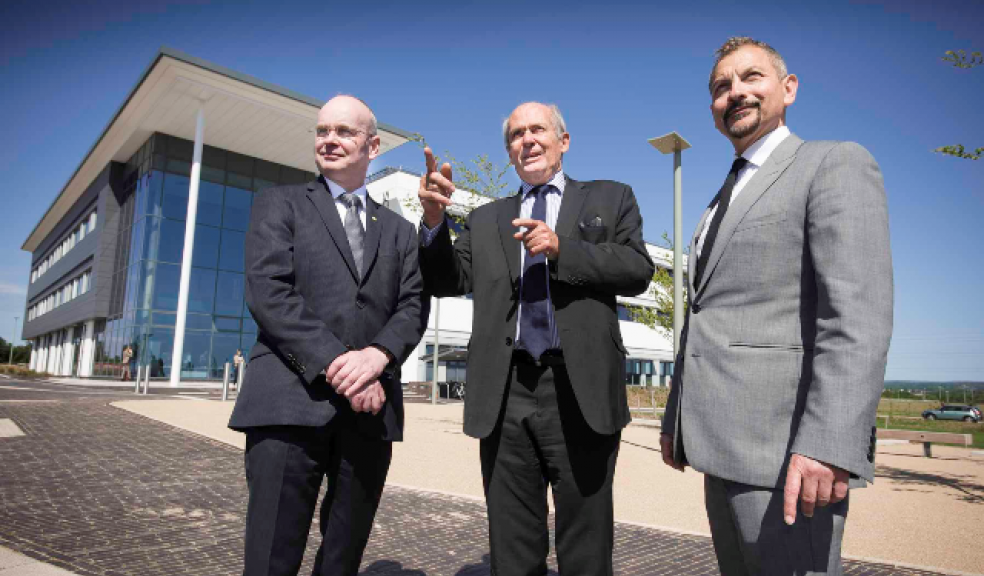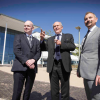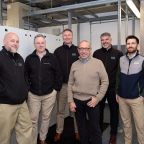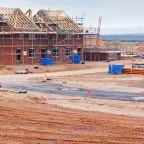
Vision of Exeter’s future unveiled
Computer screens built into contact lenses and electronics in our skin will be commonplace in a few years, according to futurologist Dr Ian Pearson.
Dr Pearson, the inventor of the text message, was speaking at a conference organised by Invest in Exeter at the city’s new Science Park Centre, which was showcasing the area as a location for inward investment.
He predicted active contact lenses will mean: “You will be able to watch TV with your eyes closed or read emails first thing in the morning without reaching for a gadget.”
Miniaturisation will be key to the computers of tomorrow, he added. “We will have ‘active skin’ with electronics on the surface of the skin which will be able to record even your sensations, so that rather than showing your friends your holiday photographs you will be able to let them know how your holiday actually felt.
“Active skin will also radically change healthcare, and people will be better able to look after themselves.”
Changing global conditions would also mean that food and climate scientists should work more closely together, he added.
But he warned that as the so-called Internet of Things develops, and more and more household items such as fridges and light bulbs become connected digitally, there will be more and more information being stored, and firms will need to come up with ways to help us sift through it to decide what is most useful especially if every household appliance needs its own secure password!
Industry will also need to decide whether to become more computerised, replacing humans with machines or robots, or to become more human, giving people more powerful tools and so enabling them to do better jobs.
Predicting what he called a care economy, where community and personal contact are highly valued, he added that emerging trends towards more localised manufacturing meant globalisation would be a short-term problem and new sources of power would soon come on stream, ending fears of future energy crises.
Also speaking at the summit was Steve Noyes, director of operations and customer services at the Met Office, whose new £97 million supercomputer will partly be based at the new Exeter Science Park.
The Met Office, which moved to the city from Berkshire in 2003, is based near the new Exeter Science Park, and today employs 500 scientists and 300 IT staff.
“We came here for a number of reasons, a key one of which was that you wanted us here,” said Mr Noyes. “We had a huge amount of support from Exeter City Council, Devon County Council and the University of Exeter enabling eighty-two per cent of staff to move with the Met Office from Bracknell.”
He said the new investment in high performance computing would bring benefits worth £2 billion to the UK economy between 2016 and 2020 in the fields of climate, renewables, airports, flooding, and food security and winter resilience.
Professor Mark Goodwin, University of Exeter deputy vice chancellor for external affairs, said the University of Exeter was now an international institution with more than 20,000 students from 130 countries and more than 4,000 staff from 81 countries. The institution is regularly in UK universities Top 10 lists, and is among the top one per cent in the world.
He quoted the Sainsbury Review into science and innovation: “Having many companies in one city does not in itself create a high-technology cluster. A cluster grows out of the research excellence of a university.”
Andrew Pearce, a director of commercial property agents JLL, said Exeter was now known as an emerging cyber city, and there was growing demand for office space for businesses with between 150 and 200 employees, driven by inward investment.
Exeter, he said, was well connected physically and digitally, with business and living costs which were substantially lower than regional and national competitors such as Bristol and Manchester.
Luke Lang, co-founder of the first online crowd funding business Crowdcube which is based in Exeter, said his team was attracting talent from Google and Ebay in the United States. These highly skilled new recruits are drawn partly by the chance to live and work in such an attractive part of the world where business is also able to thrive.
“We’re moving people from Silicon Valley to the Exe Valley,” he said.
He added that Crowdcube, set up in 2011, had raised around £80 million from 175,000 individual investors, and that the government was now using the site to invest in businesses.
Simon Barker, from the Heart of the South West Local Enterprise Partnership, said the LEP was working towards attracting inward investment in particular in the fields of aerospace, nuclear, marine and agri-tech and big data, but was also committed to looking after the companies that were already established in the area so that as they grew they continued to invest locally.
He added: “We are also completely committed to helping Exeter and its Science Park to realise its ambitions. This is a true collaboration between the public and private sectors.”
“There is something really special going on in Exeter,” he concluded.
Sir William Wakeham, chairman of the Exeter Science Park board, said: “Businesses will not move here just for the location and lifestyle possibilities, but because being based in Exeter can grow shareholder value faster and more effectively than being based in other locations.”
Lucy Smallwood, a partner in law firm Michelmores, said co-operation between the private and public sectors meant the Exeter and East Devon Growth Point, which was formed in 2006 was making fantastic progress and was expected to deliver around 25,000 jobs and 20,000 new homes.
“This is delivering new housing in Exeter supporting economic growth, but it is not just about houses but about new communities. A key driver for business is whether their staff want to be here. It’s hugely important that the masterplan on housing is done right.”
Damian Lannon, a partner in chartered accountants Francis Clark, said Exeter had a rich mix of economic, social, educational, cultural and sporting facilities, and was recognised as one of the UK’s most desirable places in which to live.
“The challenge is to ensure economic prosperity while retaining desirability and the qualities that make Exeter such a special place. The Exeter Science Park is a great example of the city doing just that.
“Exeter is at the heart of the South West business community and the city embraces its role as an area of growth. It is a natural centre of gravity for professionals in the region, and locating a business here means that you have local access to a range of professional services and also a choice of providers.”
Maureen Gori de Murden, Exeter City Council’s Senior Economy and Tourism officer, said: “This event, which was held to launch our latest Invest in Exeter campaign, was a great showcase for the city and its exciting future as a great place to do business.
“Those of us who already live and work here know what an amazing place it is. Events such as this help us to spread the word far and wide.”
The event was also supported by the Invest in Heart of the South West Inward Investment service, funded by the South West Peninsula City Deal.
Cllr Rosie Denham, Lead Councillor for Economy and Culture at Exeter City Council, said: “We were privileged to launch the Invest in Exeter campaign at the Exeter Science Park Centre – a landmark achievement for Exeter, a shining example of partnership working and a catalyst for business growth in the science and technology sector. It’s a truly exciting time for our city and our neighbours in East Devon and Teignbridge and the Heart of the South West Local Enterprise Partnership as we see years of planning, preparation and hard work come to fruition with new developments such as Skypark, Cranbrook and Matford Green.
“Alongside major investments in superfast broadband and in research and technology – the medical research centre at the University of Exeter and the Met Office supercomputer to name but a few – we are putting our city in the spotlight and showcasing its successes and its many opportunities to a much wider audience.”
For more information about Invest in Exeter visit www.investinexeter.co.uk or follow @investinexeter on Twitter.

















